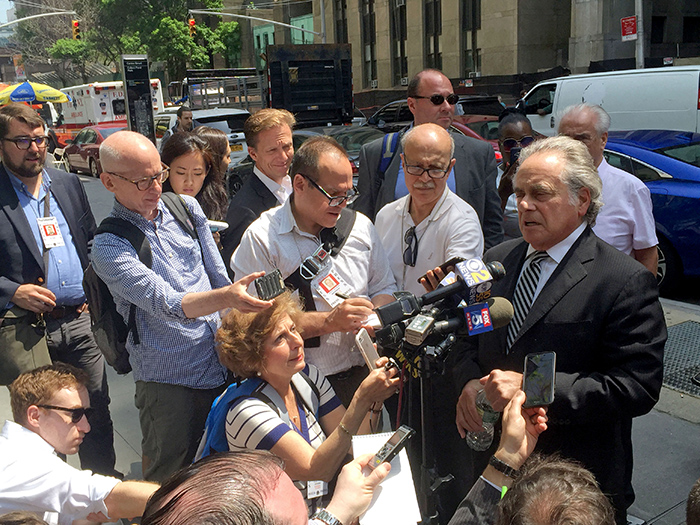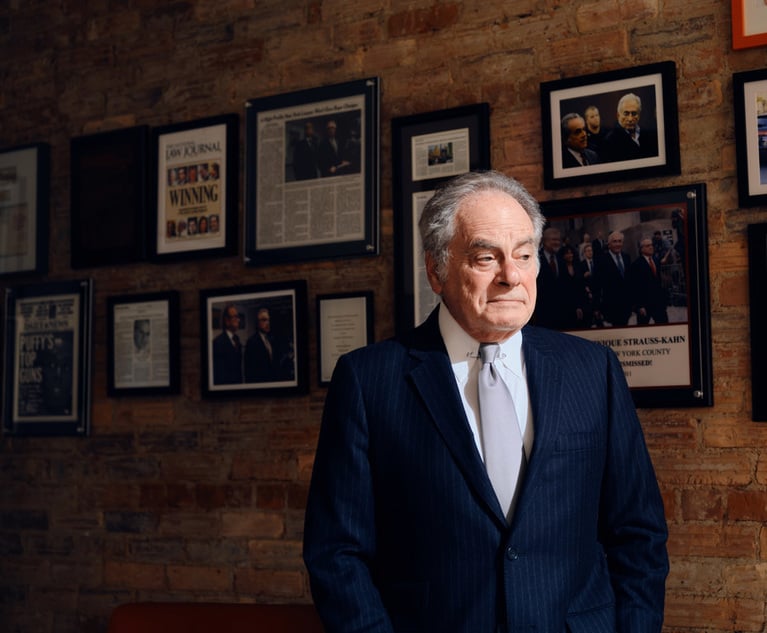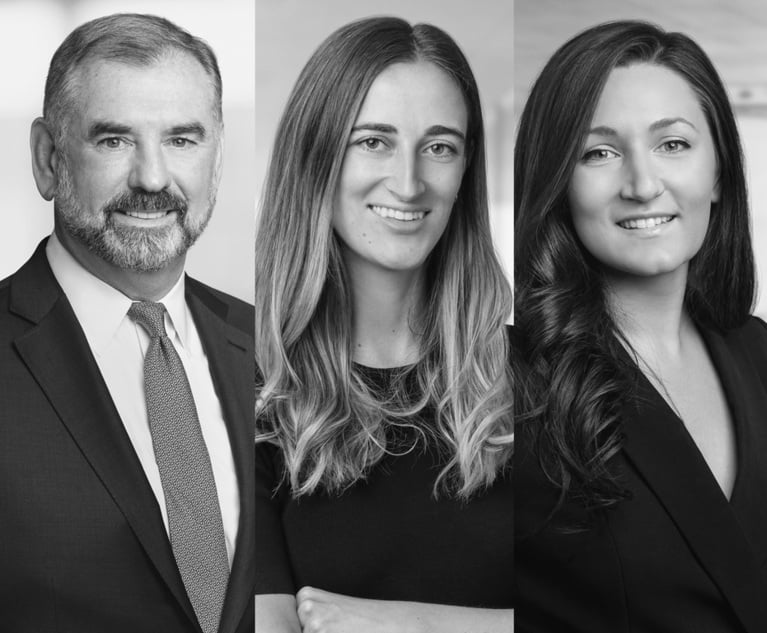Harvey Weinstein's Attorney Worried About Ability of Grand Jurors to Keep Open Mind
Brafman said he raised the concerns during a two-hour meeting with Judge James Burke and Manhattan prosecutors that's now under seal.
May 29, 2018 at 01:22 PM
3 minute read
The original version of this story was published on New York Law Journal
 Ben Brafman speaks to reporters outside Manhattan criminal court. Photo: David Handschuh/ALM.
Ben Brafman speaks to reporters outside Manhattan criminal court. Photo: David Handschuh/ALM. Harvey Weinstein's attorney Benjamin Brafman spent two hours huddled with prosecutors from the Manhattan District Attorney's office and the judge overseeing a grand jury weighing a possible indictment against his client.
But when he emerged from criminal court Judge James Burke's chambers to speak with reporters, Brafman said there was little he was able to tell, thanks to the proceedings being placed under seal.
Brafman did say, in the first court action since his client was arrested and charged with multiple sexual assault charges this past Friday, that he had asked the court to be heard this morning on “some issues of concern that have arisen” since Weinstein's arraignment, which were “largely legal issues” Brafman says he wanted to raise.
While he said he would steer clear of any of the issues now under seal, Brafman said he did raise concerns over publicity the case had generated over the long weekend, and “the ability for people to keep an open mind,” a comment likely directed toward grand jurors.
Brafman also said he was concerned about outside pressure being brought on Manhattan District Attorney Cyrus Vance, Jr.'s office to indict his client, calling it inappropriate and unprecedented.
“It troubles me, and I wanted to make those matters known to the court,” he said.
Over the weekend, news reports indicated prosecutors were looking to bring more than just the two separate women at the heart of the current rape and other sexual assault charges against Weinstein. The strategy was described as similar to that employed against Bill Cosby, where multiple women who accused the comedian were allowed to take the stand.
On Tuesday, Brafman went on to characterize the charges faced by his client as absurd. He said that the only rape charges currently levied against the former Hollywood producer were by someone with whom he had a decadelong consensual sexual relationship. While Brafman said he was unable to provide the identity of the woman, he did say that the consensual relationship occurred before and after the alleged rape.
Brafman said that none of these issues has raised a concern over whether his client could get a fair trial. The trial process, he said, allowed for lots of opportunities to vet jurors and provide for other remedies to help keep the kinds of concerns he's now raising from infecting the process.
“I'm concerned about what's going on now,” he said. He added that, should the case go to trial, he predicted his client would win.
A spokeswoman from the Manhattan DA's office declined to respond to Brafman's statement, or on the hearing itself.
This content has been archived. It is available through our partners, LexisNexis® and Bloomberg Law.
To view this content, please continue to their sites.
Not a Lexis Subscriber?
Subscribe Now
Not a Bloomberg Law Subscriber?
Subscribe Now
NOT FOR REPRINT
© 2025 ALM Global, LLC, All Rights Reserved. Request academic re-use from www.copyright.com. All other uses, submit a request to [email protected]. For more information visit Asset & Logo Licensing.
You Might Like
View All
Like a Life Raft: Ben Brafman Reflects on Nearly 50 Years as a Defense Attorney

A Reporter and a Mayor: Behind the Scenes During the Eric Adams Indictment News Cycle

Davis Polk and Legal Aid Society Team to Knock 15 Years Off Sex-Trafficking Survivor's Sentence

Litigators of the Week: Feds Drop Charges Against Maryland Lawyer Facing Fraud Case Over $12M in Somali Funds
Trending Stories
- 1ACC CLO Survey Waves Warning Flags for Boards
- 2States Accuse Trump of Thwarting Court's Funding Restoration Order
- 3Microsoft Becomes Latest Tech Company to Face Claims of Stealing Marketing Commissions From Influencers
- 4Coral Gables Attorney Busted for Stalking Lawyer
- 5Trump's DOJ Delays Releasing Jan. 6 FBI Agents List Under Consent Order
Who Got The Work
J. Brugh Lower of Gibbons has entered an appearance for industrial equipment supplier Devco Corporation in a pending trademark infringement lawsuit. The suit, accusing the defendant of selling knock-off Graco products, was filed Dec. 18 in New Jersey District Court by Rivkin Radler on behalf of Graco Inc. and Graco Minnesota. The case, assigned to U.S. District Judge Zahid N. Quraishi, is 3:24-cv-11294, Graco Inc. et al v. Devco Corporation.
Who Got The Work
Rebecca Maller-Stein and Kent A. Yalowitz of Arnold & Porter Kaye Scholer have entered their appearances for Hanaco Venture Capital and its executives, Lior Prosor and David Frankel, in a pending securities lawsuit. The action, filed on Dec. 24 in New York Southern District Court by Zell, Aron & Co. on behalf of Goldeneye Advisors, accuses the defendants of negligently and fraudulently managing the plaintiff's $1 million investment. The case, assigned to U.S. District Judge Vernon S. Broderick, is 1:24-cv-09918, Goldeneye Advisors, LLC v. Hanaco Venture Capital, Ltd. et al.
Who Got The Work
Attorneys from A&O Shearman has stepped in as defense counsel for Toronto-Dominion Bank and other defendants in a pending securities class action. The suit, filed Dec. 11 in New York Southern District Court by Bleichmar Fonti & Auld, accuses the defendants of concealing the bank's 'pervasive' deficiencies in regards to its compliance with the Bank Secrecy Act and the quality of its anti-money laundering controls. The case, assigned to U.S. District Judge Arun Subramanian, is 1:24-cv-09445, Gonzalez v. The Toronto-Dominion Bank et al.
Who Got The Work
Crown Castle International, a Pennsylvania company providing shared communications infrastructure, has turned to Luke D. Wolf of Gordon Rees Scully Mansukhani to fend off a pending breach-of-contract lawsuit. The court action, filed Nov. 25 in Michigan Eastern District Court by Hooper Hathaway PC on behalf of The Town Residences LLC, accuses Crown Castle of failing to transfer approximately $30,000 in utility payments from T-Mobile in breach of a roof-top lease and assignment agreement. The case, assigned to U.S. District Judge Susan K. Declercq, is 2:24-cv-13131, The Town Residences LLC v. T-Mobile US, Inc. et al.
Who Got The Work
Wilfred P. Coronato and Daniel M. Schwartz of McCarter & English have stepped in as defense counsel to Electrolux Home Products Inc. in a pending product liability lawsuit. The court action, filed Nov. 26 in New York Eastern District Court by Poulos Lopiccolo PC and Nagel Rice LLP on behalf of David Stern, alleges that the defendant's refrigerators’ drawers and shelving repeatedly break and fall apart within months after purchase. The case, assigned to U.S. District Judge Joan M. Azrack, is 2:24-cv-08204, Stern v. Electrolux Home Products, Inc.
Featured Firms
Law Offices of Gary Martin Hays & Associates, P.C.
(470) 294-1674
Law Offices of Mark E. Salomone
(857) 444-6468
Smith & Hassler
(713) 739-1250






